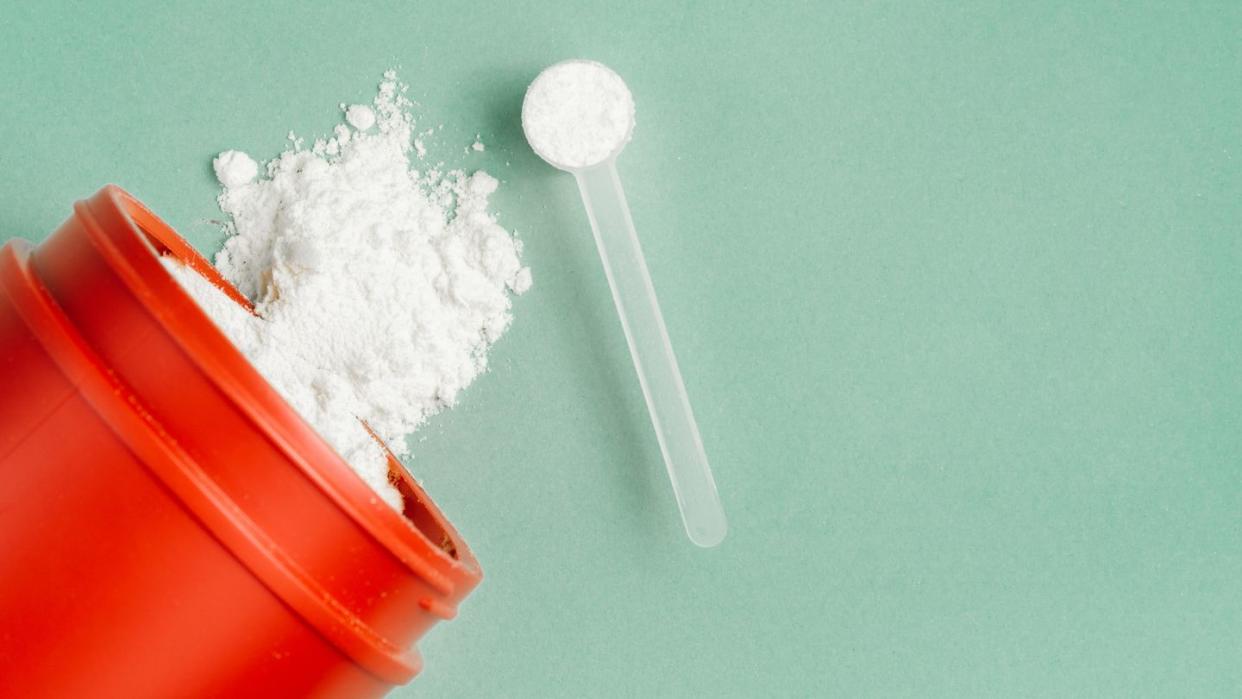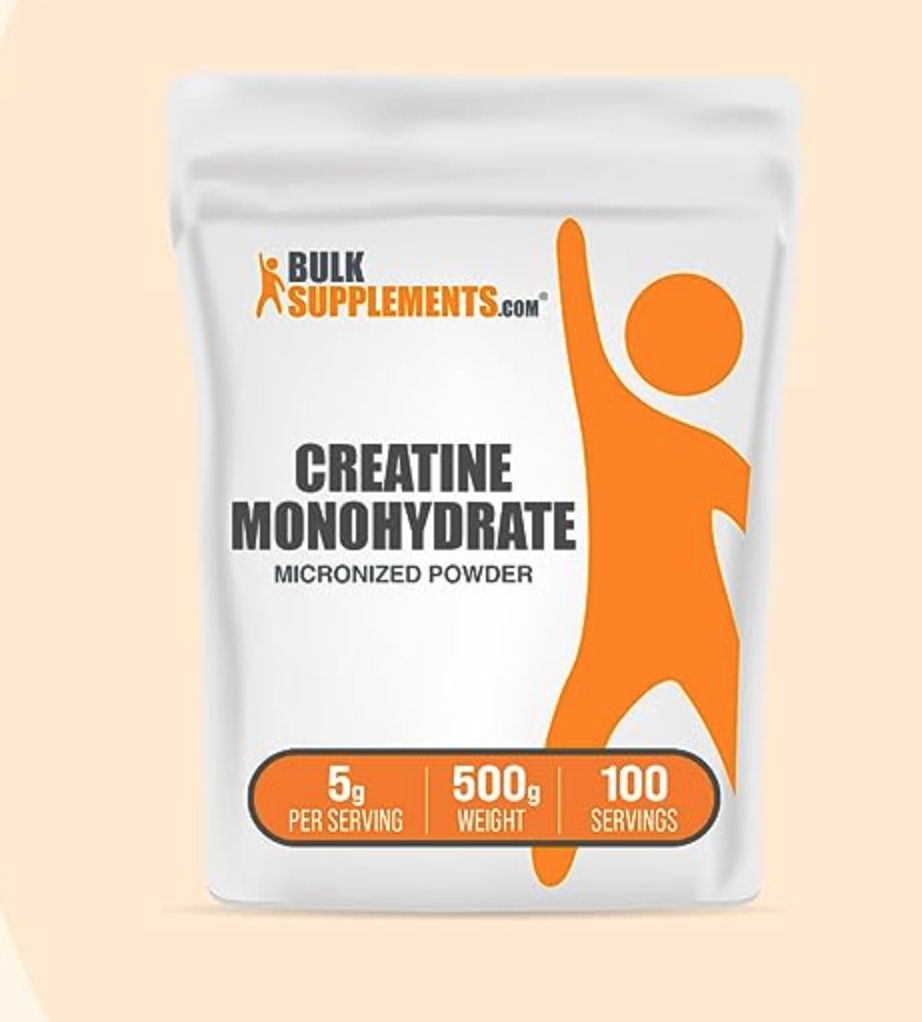The Exact Right Time to Take Creatine

"Hearst Magazines and Yahoo may earn commission or revenue on some items through these links."
If you’re into working out — whether it’s taking fitness classes, going on a regular run or jumping onto your Peloton — you may have heard chatter about the benefits of creatine supplements, and whether taking them can build stronger muscles and thus help with exercise and just overall health. And that chatter might have included some head-spinning opinions about when’s the best time to take creatine supplements: Should you take them before a workout or after? Only on days you work out or on rest days as well?
We’ve talked to experts to answer those questions, and more.
What is creatine?
Creatine is a natural energy source in our bodies that can give a major boost to your muscles and brain. It’s made up of three amino acids that fuels your body tissues, and also supplies flexing power to your skeletal muscles – a major tool in helping you get the most from your workouts.
About half the creatine in your body is produced by your liver, kidneys and pancreas; the other half should come from your diet, in the amount of 1 to 2 grams per day.

Creatine Monohydrate Powder
amazon.com
$21.96
Creatine supplements can be purchased in several different forms: You can get creatine as powders (which you dissolve in water), capsules and tablets, liquids, and even energy bars. According to Cleveland Clinic, the supplement that’s most commonly used is creatine monohydrate; other forms of creatine don’t seem to have the same advantages.
Ideally, you can get plenty of creatine by eating protein, specifically red meat and seafood, and drinking animal-derived milk (from cows, sheep or goats). “I work with a group of outstanding dieticians who all tell me that unless you are an elite athlete, you should be able to get all of your protein needs met with well-balanced meals,” says Jeanne Doperak, DO, associate professor of sports medicine and team physician at the University of Pittsburgh in Pittsburgh, PA.
When is the best time to take creatine — before or after workout?
The jury’s pretty much out on this right now. Brazilian researchers pored over numerous studies and found that the most important factors can be your age, your diet and the type of exercise you do, in terms of how effective creatine may be for you — but that the timing of when creatine is taken doesn’t seem to matter so much. Another recent small study (involving male and female athletes) agreed, determining that the timing of a creatine dose made no significant difference even after eight weeks of exercise.
“There’s quite a bit of research on creatine in general and recommended doses, but not enough concrete evidence on timing,” says Stefani Sassos, MS, RDN, nutrition director of the Good Housekeeping Institute. “Both before or after a workout seem to be beneficial for improving performance. Ultimately, I’d suggest taking it whenever it works for your schedule or workout regimen.”
When you do take a supplement, you also want to make sure you do it in a way that gives you the most significant benefit. “Research suggests that the body may better absorb creatine when it is taken with carbohydrates like fruit or fruit juice, which may be more significant a factor than timing,” Sassos adds.
You also want to make sure you watch how much coffee you drink; according to the Mayo Clinic, taking creatine while consuming more than 300 milligrams of caffeine per day may weaken creatine’s benefits. You also need to watch out for side effects, which according to data from the University of Essex can include nausea, cramps and bloating. Consult your doctor if you experience any of these symptoms to see if you need to discontinue taking creatine.
Should you take creatine every day?
Whether you take creatine only on days you work out, or on rest days as well, depends on what your doctor recommends. Creatine works best when combined with exercise; because of this, some people don’t feel it’s useful during recovery periods. Important FYI: It’s considered likely safe to take creatine for up to five years, says the Mayo Clinic.
Who should take creatine — and who shouldn’t?
What if you don’t eat the foods that supply creatine, or only consume them in small amounts? Should you take a creatine supplement? To know for sure, check in with your doctor; you want to make sure that creatine is 100% safe for you specifically. “Individuals with high blood pressure, diabetes, kidney disease or liver disease should avoid taking creatine,” says Sassos. “If you’re pregnant or nursing, I’d also suggest staying away from creatine. If you are regularly taking any NSAIDs, diuretics, Cimetidine, Probenecid or any drugs that impact your kidneys, creatine may react with these drugs and is not recommended.” You should also avoid creatine if you have any metabolic conditions that interfere with how your body processes protein.
How does creatine benefit women?
Creatine can help women improve strength, exercise capacity and bone mineral density if combined with resistance training, and can benefit both pre-and post-menopausal women.
Research has found that women who take a 0.3 g dose of creatine a day for five to seven days, or a 5 g daily dose for 4 weeks, can improve mood and brain function. To make sure you’re taking the correct dose specifically for you, it’s important to get your doctor’s recommendation.
How to choose a creatine supplement
You absolutely want to make sure you’re not taking a supplement that’s dangerous, of course. “Everyone should exercise caution when taking any supplement, including creatine,” says Doperak. “These products are not FDA approved or regulated, so manufacturers are not held responsible to any outside agency on what is contained in the product.”
This means you need to do your homework. There are two key components you should look for on the supplement’s label.
NSF: An independent and accredited organization dedicated to protecting and improving global human health that tests and certifies supplements, food and personal care products for safety. “Look for third party testing, and an NSF for Sport seal,” says Doperak. “There’s an app that can be used on your smartphone, NSF for Sport, to quickly look up a product and verify its certification. While nothing guarantees total safety, this is the best way to assure you’re getting the best and safest products on the market.”
Ingredients: Check out the ingredient section on a supplement label to make sure that only creatine is listed. “There have been many unfortunate examples of athletes testing positive on drug tests only to find out the source of their exposure was an unsafe-tainted supplement,” Doperak adds.
The bottom line: The best time to take creatine is really up to you – choosing and using the supplement safely should always be your biggest concern.
You Might Also Like
